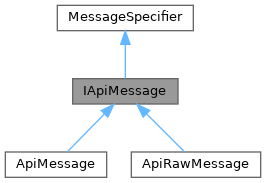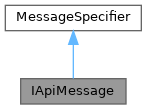Interface for messages with machine-readable data for use by the API. More...


Public Member Functions | |
| getApiCode () | |
| Returns a machine-readable code for use by the API. | |
| getApiData () | |
| Returns additional machine-readable data about the error condition. | |
| setApiCode ( $code, array $data=null) | |
| Sets the machine-readable code for use by the API. | |
| setApiData (array $data) | |
| Sets additional machine-readable data about the error condition. | |
 Public Member Functions inherited from MessageSpecifier Public Member Functions inherited from MessageSpecifier | |
| getKey () | |
| Returns the message key. | |
| getParams () | |
| Returns the message parameters. | |
Detailed Description
Interface for messages with machine-readable data for use by the API.
The idea is that it's a Message that has some extra data for the API to use when interpreting it as an error (or, in the future, as a warning). Internals of MediaWiki often use messages (or message keys, or Status objects containing messages) to pass information about errors to the user (see e.g. Title::getUserPermissionsErrors()) and the API has to make do with that.
- Since
- 1.25
Definition at line 35 of file ApiMessage.php.
Member Function Documentation
◆ getApiCode()
| IApiMessage::getApiCode | ( | ) |
Returns a machine-readable code for use by the API.
The message key is often sufficient, but sometimes there are multiple messages used for what is really the same underlying condition (e.g. badaccess-groups and badaccess-group0)
- Returns
- string
◆ getApiData()
| IApiMessage::getApiData | ( | ) |
Returns additional machine-readable data about the error condition.
- Returns
- array
◆ setApiCode()
| IApiMessage::setApiCode | ( | $code, | |
| array | $data = null |
||
| ) |
Sets the machine-readable code for use by the API.
- Parameters
-
string | null $code If null, the message key should be returned by self::getApiCode() array | null $data If non-null, passed to self::setApiData()
◆ setApiData()
| IApiMessage::setApiData | ( | array | $data | ) |
Sets additional machine-readable data about the error condition.
- Parameters
-
array $data
The documentation for this interface was generated from the following file:
- includes/api/ApiMessage.php